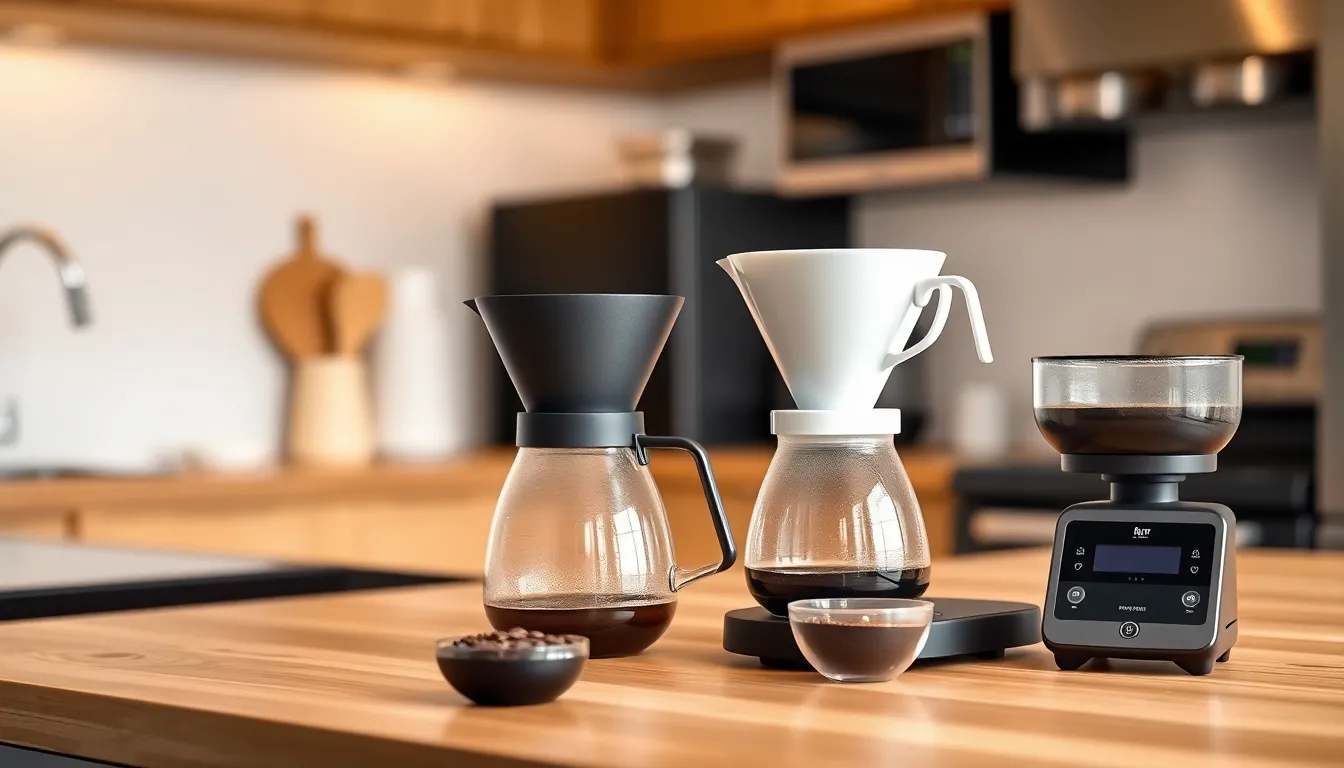For coffee lovers, nothing beats the rich aroma of freshly brewed filter coffee. This classic brewing method not only highlights the unique flavors of coffee beans but also offers a simple yet satisfying ritual. Whether it’s the morning pick-me-up or an afternoon treat, mastering the art of filter coffee can elevate any coffee experience.
Making good filter coffee is all about balance. From selecting the right beans to perfecting the brew time, each step plays a crucial role in achieving that ideal cup. With a few easy tips and techniques, anyone can transform their daily coffee routine into a delightful ritual that awakens the senses and warms the heart. Dive into the world of filter coffee and discover how to brew a cup that’s not just good, but truly exceptional.
Table of Contents
ToggleUnderstanding Filter Coffee
Filter coffee refers to a method that allows hot water to extract flavors from coffee grounds using a filter. This process produces a clean and aromatic drink that showcases the distinct characteristics of the coffee beans.
What Is Filter Coffee?
Filter coffee is brewed by pouring hot water over coarsely ground coffee, which then passes through a filter. This technique provides a smooth texture and rich flavor profile. Common methods of brewing filter coffee include using a pour-over, drip coffee maker, or traditional South Indian filter. Each method emphasizes different aspects of the coffee.
Benefits of Filter Coffee
Filter coffee offers several advantages:
- Clarity in Flavor: The filtration process eliminates fine particles, enhancing the clarity and brightness of flavors.
- Lower Acidity: Many filter coffee preparations result in lower acidity, making it gentler on the stomach.
- Control Over Brew Variables: Brew time, water temperature, and coffee grind size can all be easily adjusted to optimize flavor extraction.
- Health Benefits: Filter coffee contains antioxidants and can contribute to heart health when consumed in moderation.
- Convenience: The brewing process is simple and adaptable for both individual servings and larger quantities, ideal for any time of day.
Exploring various brewing techniques and understanding filter coffee’s characteristics allows coffee enthusiasts to elevate their brewing experience.
The Essential Equipment

Making good filter coffee requires specific equipment that enhances flavor and improves the brewing process. This equipment includes coffee makers and various accessories to create the perfect brew.
Coffee Maker Types
- Pour-Over Coffee Makers: Pour-over coffee makers offer precise control over brewing time and water flow. Popular models include Hario V60 and Chemex. They allow users to enjoy an immersive brewing experience, extracting unique flavors.
- Drip Coffee Makers: Drip coffee makers are convenient for brewing larger quantities. They automate the brewing process and usually feature built-in water reservoirs. Brands like Cuisinart and Mr. Coffee provide reliable options for daily use.
- French Press: For a richer taste, the French press extracts oils and flavors from coffee grounds. Just steep coarsely ground coffee in hot water for 4 minutes before pressing down the plunger.
- AeroPress: The AeroPress is a compact and portable option ideal for travel. It brews coffee under pressure, producing a strong concentrate similar to espresso. Its versatility allows for both hot and cold brews.
Necessary Accessories
- Coffee Grinder: A quality burr grinder ensures consistent grinding. Freshly ground coffee releases more flavor. They come in manual and electric styles, with models like Baratza and Breville being highly recommended.
- Kettle: A gooseneck kettle enables precise pouring control and even water distribution. Temperature control is essential, with ideal brewing temperatures ranging from 195°F to 205°F.
- Coffee Scale: A digital coffee scale measures the coffee and water accurately. This consistency helps achieve the perfect brew ratio, typically 1:15 coffee to water.
- Filter Papers: Using the right filter papers affects the clarity and taste of the coffee. Ensure compatibility with the selected coffee maker, with common options being bleached and unbleached papers.
- Thermometer: A thermometer is useful for monitoring water temperature, ensuring it remains within the ideal brewing range. This precision directly influences the extraction process.
Choosing the Right Coffee Beans
Selecting quality coffee beans significantly enhances the filter coffee experience. Factors such as bean type and freshness play critical roles.
Types of Coffee Beans
Arabica and Robusta are the primary coffee bean types.
- Arabica: Known for its smooth, mild flavor with nuanced acidity. Arabica beans often have a variety of flavor notes, such as floral and fruity. They account for about 60-70% of the world’s coffee production.
- Robusta: Characterized by its strong, bold taste with higher caffeine levels. Robusta beans typically present a heavier body and earthy flavors, making them less preferred for filter coffee.
Choosing Arabica beans often results in a more refined cup, especially for filter brewing.
Freshness and Grind Size
Freshness impacts flavor and aroma significantly.
- Freshly roasted beans: Ideally, they should be used within two to three weeks after roasting for optimal flavor.
- Storage: Beans should be kept in an airtight container, away from light, heat, and moisture to maintain their freshness.
Grind size affects extraction.
- Coarse grind: Generally recommended for filter coffee, as this helps achieve a balanced extraction without over-extraction bitterness.
- Consistent grind: A burr grinder is preferable to ensure uniformity, promoting even extraction and enhancing overall flavor.
Choosing the right beans and ensuring their freshness and appropriate grind size create the foundation for brewing excellent filter coffee.
The Brewing Process
The brewing process is crucial for creating a delicious cup of filter coffee. Precision in measurements and careful selection of techniques leads to rich flavors and satisfying aromas.
Measuring Coffee and Water
Measuring coffee and water accurately ensures balanced flavor extraction. A common ratio is 1:15, meaning one gram of coffee for every 15 grams of water. For a standard 12-cup coffee maker, this translates to approximately 80 grams of coffee and 1,200 grams (or milliliters) of water. Using a digital scale enhances precision, providing consistency with each brew. Freshly ground coffee enhances extraction, enriching the overall taste profile.
Brewing Techniques
Different brewing techniques offer unique flavor experiences in filter coffee. Popular methods include:
- Pour-Over: Involves slowly pouring hot water over coffee grounds in a circular motion, allowing for even extraction. Control over the pour rate influences flavor intensity.
- Drip Coffee Maker: Automates the brewing process with hot water dripping through coffee grounds. Known for convenience, it allows for larger quantities and consistent brews.
- French Press: While not a traditional filter method, using a metal or cloth filter creates a bold flavor. Coarsely ground coffee soaks in hot water before pressing down the filter.
- AeroPress: Combines immersion and pressure to brew coffee. This method achieves strong, smooth flavors in a short time while allowing for experimentation with brew times and grind sizes.
Each technique requires attention to water temperature, typically between 195°F and 205°F, to maximize flavor extraction without introducing bitterness. Experimenting with these methods helps identify personal preferences, further refining the coffee experience.
Tips for Perfecting Your Brew
Mastering the art of filter coffee requires attention to detail. Fine-tuning specific elements can elevate the flavor and aroma, creating a delightful coffee experience.
Water Temperature and Quality
Water temperature significantly influences flavor extraction. Ideal brewing temperature ranges from 195°F to 205°F (90°C to 96°C). At this temperature, coffee grounds extract optimal flavors without introducing bitterness. Using filtered water enhances taste and quality, as impurities in tap water can adversely affect the flavor profile. Ensure the water is free from strong scents or minerals, as these can alter the coffee’s natural taste.
Brewing Time
Brewing time plays a critical role in taste. A general guideline for brewing filter coffee is 3 to 4 minutes. Shorter brewing times may lead to under-extraction, resulting in sour flavors. Longer times tend to over-extract, causing bitterness. Adjusting brewing time allows for customization based on preferred strength and flavor. Monitoring this factor ensures a balanced cup, highlighting the unique characteristics of the chosen coffee beans.
Common Mistakes to Avoid
Avoiding common mistakes during the brewing process greatly enhances the filter coffee experience. Attention to detail ensures a rich and flavorful cup.
Over or Under Brewing
Over brewing and under brewing drastically affect coffee quality. Over brewing leads to bitterness and astringency, while under brewing results in a sour and weak flavor. Stick to a brewing time of 3 to 4 minutes. Experimentation within this range allows for customization based on personal taste preferences. Use a timer to monitor brewing time consistently and maintain the desired flavor profile.
Incorrect Coffee-to-Water Ratio
Using the wrong coffee-to-water ratio can severely compromise flavor. A common ratio of 1:15 coffee to water delivers balanced extraction. For instance, use 20 grams of coffee for 300 milliliters of water. Adjust this ratio slightly to cater to individual taste preferences, but avoid significant deviations that could lead to undesirable results. Weighing coffee accurately with a digital scale ensures precision in measurements and consistent brews.
Brewing filter coffee is more than just a routine; it’s an art that transforms simple ingredients into a flavorful experience. By selecting quality beans and mastering the brewing process, anyone can enjoy a cup that delights the senses.
Experimenting with different techniques and paying attention to details like grind size and water temperature can elevate the coffee experience. With the right tools and knowledge, the journey to perfect filter coffee becomes a rewarding ritual.
Embrace the process and savor the rich aromas and flavors that come with each brew. Whether it’s a morning pick-me-up or an afternoon treat, great filter coffee is always worth the effort.


